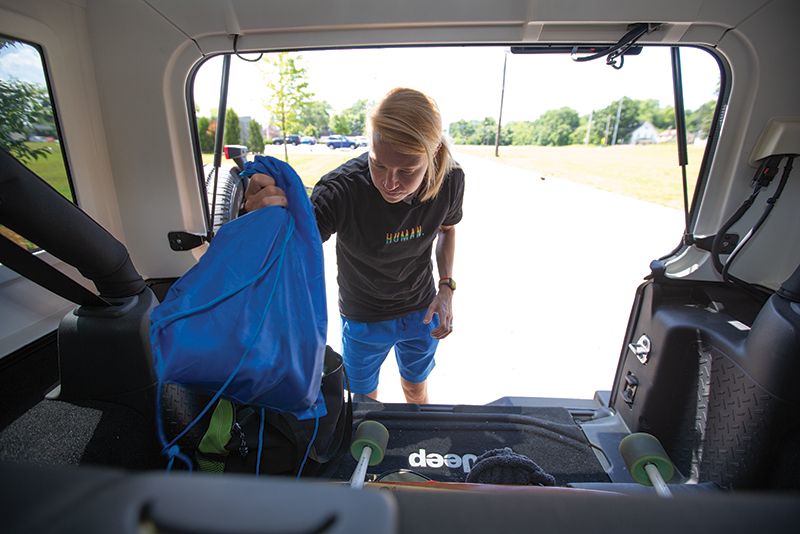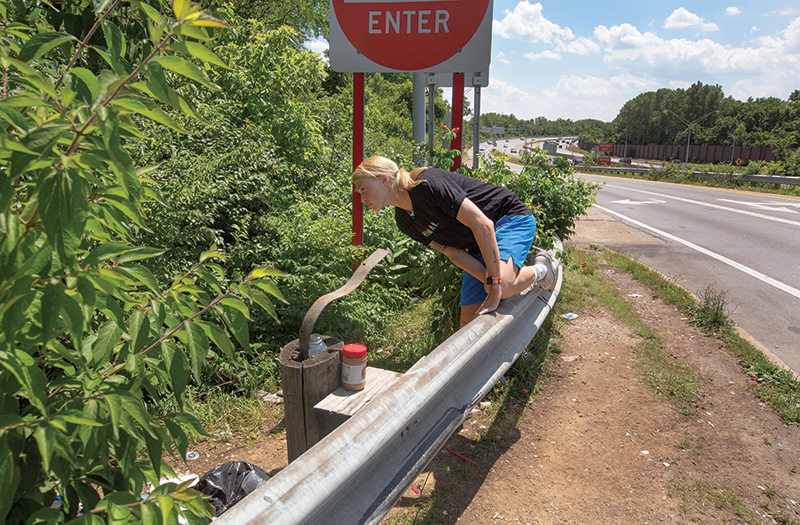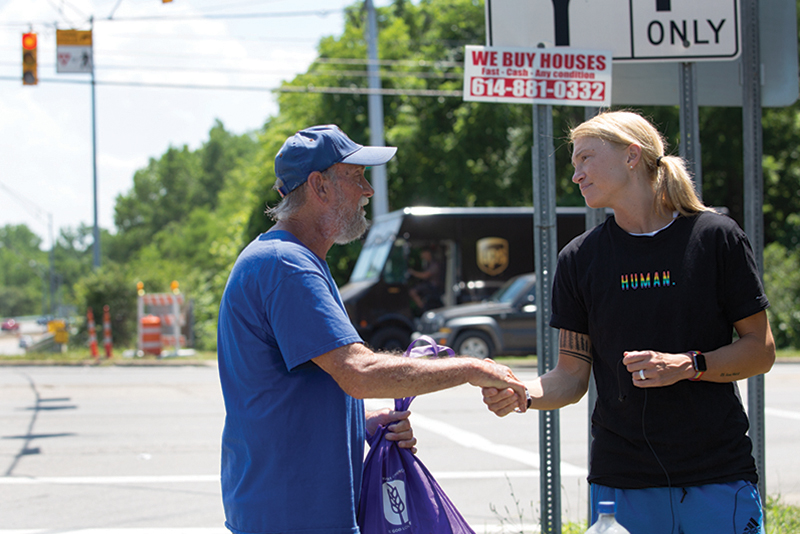Alli Krivanek
Some of the scenes stay with her longer than the others, mess with her emotions a little more, put a wider crack in her breaking heart.
Like the night that Alli Krivanek—as a volunteer with an organization that responds to the locations of suicides to help those left behind—arrived only to learn that the person who died had been waiting on a ride somewhere. And no one showed up to take her.
That one hurt maybe the most because showing up is what Krivanek tries to do. Every day. All the time. For so many people. Not in big or flashy ways but just in spontaneous, meaningful moments that say, “I see you. You matter.”
Moments like buying Wendy’s Frosties on a July day and delivering them to local police officers. Like calling restaurant managers over not to complain but to tell them what a great experience she’d just had. Like taking a bouquet of fresh flowers to the Walmart door greeter because she was running errands that day anyway. Like baking cookies for firefighters, ministering to prisoners, doing laundry for the homeless.
Kindness, after all, is Krivanek’s native language.
“When somebody feels valued and loved, that’s like my drug,” said Krivanek, a 27-year-old registered nurse from Powell. “A lot of us get overwhelmed thinking we have to save the world. But it’s really just the little things to show someone matters.”
Alli Krivanek fills her life with small acts of love and kindness, including stopping to give bags of supplies to homeless people on the streets. Tim Johnson | Dispatch Magazines
Alli Krivanek looks in the bushes along the Fifth Avenue exit from I-670 for a young homeless couple who frequent the area. She did not find them on this trip. Tim Johnson | Dispatch Magazines
Growing up in a faith-based home and learning from a young age that love is a conscious act, one that helps you spread seeds of compassion wherever you go, doing for others always came pretty naturally for Krivanek.
Then in 2014 she met Lacie Helms, the love of her life and the woman she expected to marry. Helms cared for strangers and friends alike in a way Krivanek had never seen. “Love hard” was her motto—and it wasn’t just a phrase, but a way of life. It’s now a tattoo on Krivanek’s left forearm, and a truncated version is her personalized license plate—daily reminders to always do for others first.
But they are daily reminders of what she has lost, too. Helms died by suicide in November 2016 at the age of 23.
It changed everything.
“I know that I thought in my head that life will never get better,” Krivanek recalled. “I was in a very dark place, and I realized that I thought there was no hope.”
Yet within just a few weeks she spotted a tiny glimmer when (at her mother’s urging) she agreed to meet Denise Meine-Graham for coffee. Meine-Graham founded Franklin County LOSS in 2014 following her son’s suicide in 2012. LOSS provides support groups, companionship and other outreach to those who have lost someone to suicide.
Huddled by the fire at a local Panera, the two laughed, cried, supported and mourned. And before long, Kravinek went from a participant in LOSS’s programs to one of its most dedicated volunteers.
“LOSS is really where my heart is,” she said. “It helped me take my grief and use it for good. There’s not a day that goes by that the loss of Lacie has not allowed me to love other people better, to spread love better and to be there and support people.”
A few months after meeting Meine-Graham, Kravinek started helping with fundraisers and sending encouraging cards and notes to suicide survivors. Then she progressed to sharing her and Lacie’s story in front of groups of strangers. And for the past year or so, she’s been serving as part of those teams of at least two people who respond to the scenes.
Meine-Graham said Krivanek is a genuine comforter to those who now walk the path where she has been. It takes a special kind of person, she said, to sit with families in their darkest hour.
“It’s very natural as human beings to want to help, and by default that means providing messages of hope. And those fall on deaf ears at the scene of a trauma,” Meine-Graham said. “Alli can be such an engaged listener without saying ‘but things are going to get better.’ She is uplifting and encouraging without just offering platitudes.”
Helping others heal—whether in her role as a nurse at the Ohio State University James Cancer Hospital, visiting the homeless on the streets of Columbus, or in a stranger’s backyard after crisis came calling—has been a gift from God, Krivanek said. Because everything she does is rooted in her Christian faith. As she heads to a scene, she always prays for God to use her in any way the people she’s rushing to be with may need.
“Some people need a hug. Some people don’t want to be touched,” she said. So often she just sits with them in silence. It’s about being there, a presence.
“I feel like it’s a privilege … to be somebody’s grief companion,” she said. “A lot of people lack faith. A lot of people lack hope. A lot of people lack joy. I just want you to remember someone was there to hold you.”
Krivanek has worked on the leukemia floor at the James for three years and chose it, in part, because the very nature of that awful cancer means patients generally have long stays there. That means there’s time for relationship building with families; for Krivanek, her nursing job isn’t so much about the paycheck as it is just another way of caring for others.
Sandy Adams saw Kravinek’s thoughtfulness time and again when her husband, Bill, spent 60 days at the James late last year. It was little things to keep their spirits up, like bringing the couple their favorite morning coffees, surprising Sandy with chocolate cake and ice cream on her birthday because Bill was worried no one would remember, or texting them regularly even now that they are back in their northern Kentucky home.
Alli Krivanek gives a bag of supplies to Terry, a homeless man. Tim Johnson | Dispatch Magazines
Or moments like the one where, from her husband’s room, Sandy heard someone singing, as loud as they could, “If you’re happy and you know it clap your hands …” as they headed down a hallway. Sandy didn’t even have to get up and peek out of the room; she knew it was Krivanek.
Moreover, Sandy said, Krivanek knew she didn’t need to be cheerful all the time, and she was tuned in to days when all Bill just wanted was to have someone listen as he talked about golf.
“We loved every nurse at the James. So incredible. But Alli is like a walking pinata—she is just ready to burst with something good,” Sandy said. “Anybody who is around her wants to be better.”
All of this praise, of course, makes Krivanek uncomfortable. But it makes her smile—her signature wide, open-mouthed grin that practically splits her face.
“My goal is not to give a homeless person a bag of goodies,” she said. “My goal is to make somebody feel valued and special and noticed.”


